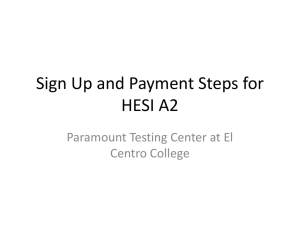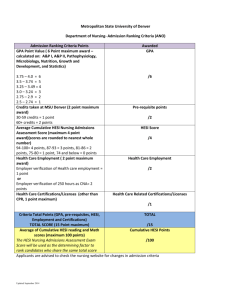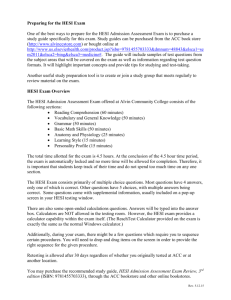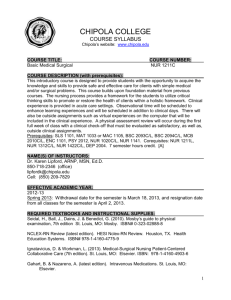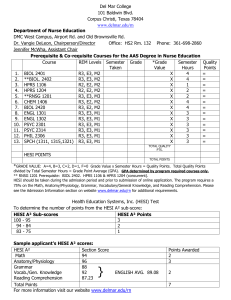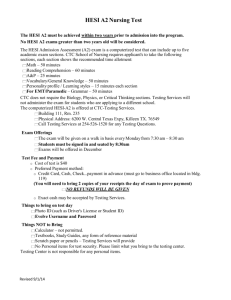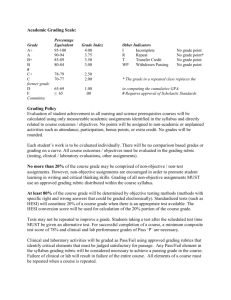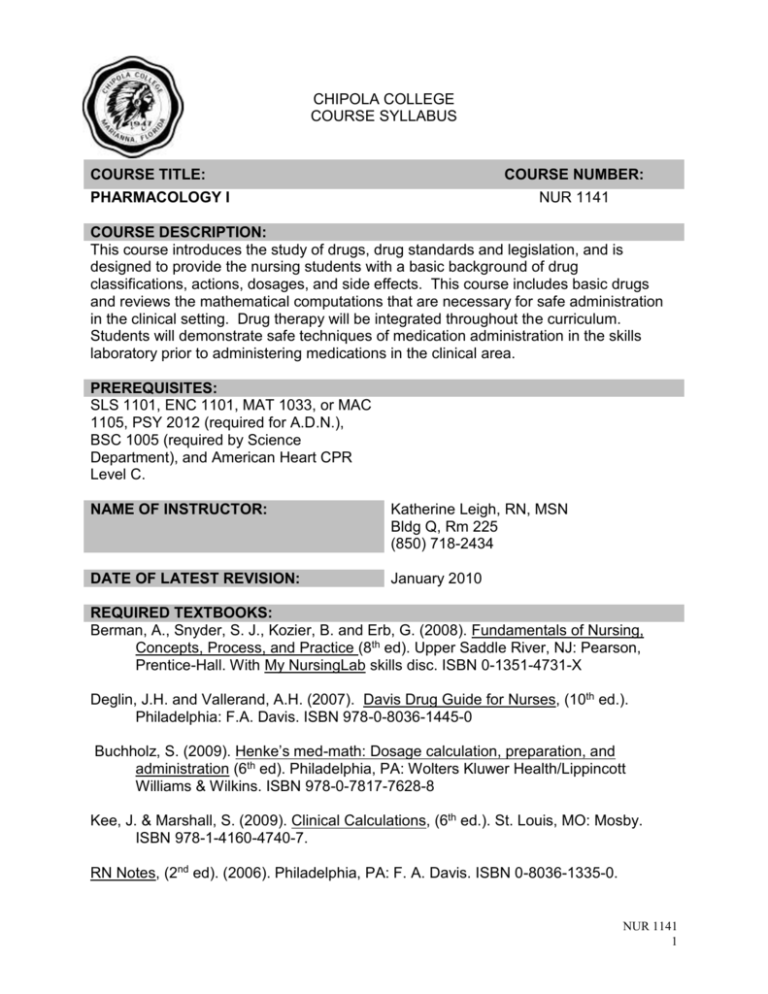
CHIPOLA COLLEGE
COURSE SYLLABUS
COURSE TITLE:
COURSE NUMBER:
PHARMACOLOGY I
NUR 1141
COURSE DESCRIPTION:
This course introduces the study of drugs, drug standards and legislation, and is
designed to provide the nursing students with a basic background of drug
classifications, actions, dosages, and side effects. This course includes basic drugs
and reviews the mathematical computations that are necessary for safe administration
in the clinical setting. Drug therapy will be integrated throughout the curriculum.
Students will demonstrate safe techniques of medication administration in the skills
laboratory prior to administering medications in the clinical area.
PREREQUISITES:
SLS 1101, ENC 1101, MAT 1033, or MAC
1105, PSY 2012 (required for A.D.N.),
BSC 1005 (required by Science
Department), and American Heart CPR
Level C.
NAME OF INSTRUCTOR:
Katherine Leigh, RN, MSN
Bldg Q, Rm 225
(850) 718-2434
DATE OF LATEST REVISION:
January 2010
REQUIRED TEXTBOOKS:
Berman, A., Snyder, S. J., Kozier, B. and Erb, G. (2008). Fundamentals of Nursing,
Concepts, Process, and Practice (8th ed). Upper Saddle River, NJ: Pearson,
Prentice-Hall. With My NursingLab skills disc. ISBN 0-1351-4731-X
Deglin, J.H. and Vallerand, A.H. (2007). Davis Drug Guide for Nurses, (10th ed.).
Philadelphia: F.A. Davis. ISBN 978-0-8036-1445-0
Buchholz, S. (2009). Henke’s med-math: Dosage calculation, preparation, and
administration (6th ed). Philadelphia, PA: Wolters Kluwer Health/Lippincott
Williams & Wilkins. ISBN 978-0-7817-7628-8
Kee, J. & Marshall, S. (2009). Clinical Calculations, (6th ed.). St. Louis, MO: Mosby.
ISBN 978-1-4160-4740-7.
RN Notes, (2nd ed). (2006). Philadelphia, PA: F. A. Davis. ISBN 0-8036-1335-0.
NUR 1141
1
Taber, C. W. (2001). Taber’s Cyclopedia Medical Dictionary, (20h ed.). Philadelphia:
F.A. Davis. ISBN 0-8036-1263-X.
Recommended Textbook:
Holloway, B. (2001). Nurse’s Fast Facts, (2nd ed.). Philadelphia: F. A. Davis.
ISBN 0-8036-0599-4.
GRADING POLICIES:
A 93-100
B 83- 92
C 75- 82
D 60- 74
F
0-59
Unit exams
70%
Final Exam(s) 30%
Quizzes will be administered at the discretion of the instructor. Students who are tardy
for class will not be allowed to take the quiz and will receive a zero.
The School of Nursing requires students to maintain a minimum grade of 75. Students
must have a non rounded unit exam grade average of 75 or above before they will be
allowed to take the final exam. Grades in the nursing program are NOT rounded.
The HESI Confidentiality Statement:
All HESI exams are secure exams. In order to take the exam, all examinees will sign a
confidentiality statement prior to logging onto the exam and will agree not to discuss
the exam questions, rationales, or answer with any other possible examinee.
Additionally, legal action will be taken by HESI against any known violator.
Final Exams:
Two Health Education Systems, Inc. (HESI) final exams will be administered in each course
within the nursing program. If upon completion of the 1st HESI final exam the student scores
less than 850, a remediation packet will be emailed to the address supplied by the student
upon beginning the exam. Each student that scores below 850 must complete the entire
remediation packet and submit confirmation as scheduled on the course calendar. The 2nd
HESI final exam will only be administered to students who have completed his/her entire
remediation packet. Test scores from the 1st and 2nd HESI final exams will be averaged
together to formulate the student’s final exam grade, this averaged final exam grade will then
be used to calculate the students overall course grade as delineated in the course syllabus.
Students failing to complete and provide confirmation that the remediation packet has been
completed will be assigned a grade of zero (“0”) for the 2nd HESI final exam. The zero (“0”)
will then be averaged with the student’s score from the 1st HESI final exam to formulate the
student’s final exam grade. The student’s averaged final exam grade is then used to calculate
the student’s overall course grade.
NUR 1141
2
The recommended HESI benchmark score is 900, however an 850 is considered acceptable
in the Chipola College Nursing Program. Therefore students making above an 850 on the 1st
HESI final exam are strongly encouraged to review and remediate areas of weakness as
indicated on their individual HESI final exam score report. Students scoring above an 850
may also take the 2nd HESI final exam. However, if a student chooses to take the 2 nd HESI
final exam the two scores must be averaged together to formulate the student’s final exam
grade.
Achievement Testing: HESI (Health Education Systems Incorporated) RN-Exit Exam
Students in the final semester (semester 5) of the ADN program are required to take a
Comprehensive exit exam published by HESI (HESI E2). The student is required to achieve
the benchmark score on the examination. Any student who does not achieve the
benchmark score will not graduate. Students will be given three opportunities to take this
examination and earn the benchmark score. There will be an additional charge of $35.00 for
each second and third attempt. This fee will be paid by the student.
In preparation for success on NCLEX-RN, the nursing program utilizes a national testing
program upon admission and throughout the program. Student participation in this academic
testing program (HESI) is a requirement. This program consists of a number of specialty
exams related to specific content. Students who fail to achieve the benchmark score on a
specialty test will contact their faculty and develop a plan to increase knowledge in the
specialty area. This course utilizes a HESI specialty exam as the final exam for this course.
Each student will take the HESI E2. The student will complete the exam and
achieve the standard benchmark level score in order to graduate.
Students who fail to meet the benchmark standard score on the first attempt will
remediate the material missed on the exam by utilizing the individualized HESI
remediation plan. Remediation activities will be assigned to the student in an
effort to assist the student in preparing for their second attempt.
Any student who fails to meet the benchmark score on the second HESI E2
exam will be required to complete the individualized HESI remediation and
assigned activities plan(s) and meet with faculty prior to the third and final time.
Any student who does not meet the benchmark score on their third attempt will
not graduate. Students will have the option of enrolling in NUR 2960, Nursing
Review I, the following semester and retake the HESI E2 exam. Achievement of
the benchmark score must be obtained for the student to meet the graduation
requirements for the Chipola College Nursing Program.
Students must also attend the three day NCLEX review course. Failure to do so will
result in a grade of incomplete for this course.
Any student experiencing difficulty in any of the nursing classes is encouraged to seek
assistance. The ACE tutoring lab is located in Building L and services are free to all students.
The Chipola Catalog provides specific information regarding other outcomes from the grading
system. A student’s Grade Point Average is derived from the grading system/quality point
scale.
NUR 1141
3
DISCIPLINE-SPECIFIC NUR 1141 COMPETENCIES / LEARNING OUTCOMES:
N1. Utilize the nursing process to plan, to implement, and to evaluate safe nursing
care to promote the health of individuals and families with nursing problems.
N2. Demonstrate competence in nursing skills, including the cognitive, psychomotor,
and affective domain.
N3. Recognize, intervene as necessary or alert appropriate persons to changes in a
patient’s condition which changes the level of care
N4. Apply principles of bio-physical, environmental, psychological, and socio-cultural
sciences while providing comprehensive nursing care.
N5. Use communication effectively with clients, families, significant others, and health
team members.
N6. Modify his/her own behavior for enhancements of relationships with others
N7. Enable individuals and families to access available social and health resources
within the community to meet identified healthcare needs.
N8. Adhere to legal and ethical principles of nursing practice. These principles
include: assuming responsibility for personal and educational growth, using
sound judgment to make decisions related to clinical performance, and seeking
help when necessary.
N9. Participate as a member of various nursing organizations.
N10. Protect the privacy and rights of clients by acting as a client advocate.
N11. Meet all requirements to take the National Council Licensure Examination
(NCLEX).
STUDENT LEARNING OUTCOMES/OBJECTIVES FOR NUR 1141
See chart, last page.
MEANS OF ACCOMPLISHING OUTCOMES:
Teaching Strategies:
Lecture, discussions, audiovisuals, supplemental readings, computer assisted
programs, individual and group assignments and clinical lab.
LIBRARY AND ON-LINE REFERENCE MATERIALS:
The library is a comprehensive, learning resource center providing information in print,
electronic, and multimedia format to support the educational objectives of the College.
In addition to print media, online catalogs and resources can be accessed through
www.linccweb.org and www.netlibrary.com. Library hours are posted each semester at
the building entrance.
Chipola’s website is located at www.chipola.edu.
See your First Day Handout for individual instructor recommendations and
resources.
TECHNOLOGY RESOURCES:
The Information Technology Center, located in the library, is equipped with computer
workstations. Lab hours are posted each semester at the building entrance.
NUR 1141
4
ASSIGNMENT SCHEDULE:
See your course calendar for individual instructor assignment schedule.
ATTENDANCE AND WITHDRAWAL POLICIES:
Chipola College expects regular attendance of all students. Students who are absent
from classes for any reason other than official college activities must satisfy the
instructor concerned that the absence was due to illness or other clearly unavoidable
reasons. Otherwise, the student may suffer grade loss at the discretion of the
instructor.
Chipola policy allows each instructor to specify in the course handout the attendance
policy. It also allows the instructor to decide whether or not an absence is excusable
and what affect the absence or tardy may have on the grade.
A student is allowed to repeat a course a maximum of three (3) times. On the third
attempt a student (1) must bear the full cost of instruction, (2) cannot withdraw, and (3)
must receive a grade.
See you Chipola college School of Nursing Handbook and First Day Handout for
department-specific attendance and withdrawal policy.
MAKE-UP POLICY:
Chipola allows each instructor to specify in the instructor handout the makeup policy.
Please see your first day handout for individual instructor policy.
ACADEMIC HONOR CODE POLICY:
Students are expected to uphold the Academic Honor Code. Chipola College’s Honor
Code is based on the premise that each student has the responsibility to
1) uphold the highest standards of academic honesty in his/her own work;
2) refuse to tolerate academic dishonesty in the college community; and
3) foster a high sense of honor and social responsibility on the part of students.
Further information regarding the Academic Honor Code may be found in the Chipola
Catalog, Student Governance section.
STUDENTS WITH DISABILITIES POLICY:
Chipola College is committed to making all programs and facilities accessible to anyone
with a disability. Chipola’s goal is for students to obtain maximum benefit from their
educational experience and to effectively transition into the college environment.
Students with disabilities are requested to voluntarily contact the Office of Students with
Disabilities to complete the intake process and determine their eligibility for reasonable
accommodations.
NUR 1141
5
LINKING COURSE-LEVEL OUTCOMES WITH DISCIPLINE-SPECIFIC
COMPETENCIES AND ASSESSMENT METHODS
COURSE-LEVEL STUDENT LEARNING OUTCOMES
FOR NUR 1141
The student will:
At the completion of this course, the student will be able
to:
1. Convert between different systems of
measurement (household, metric and
apothecary).
COLLEGE-LEVEL
AND DISCIPLINESPECIFIC
GENERAL
EDUCATION
COMPETENCIES*
METHODS OF
ASSESSMENT
USED BY
FACULTY
N2, M1
Test, clinical
practice
2. Define terms related to medication and
pharmacology.
N2, N5, N6, NS
2, C2
Test, clinical
practice
3. Explain drug standards and legislation, the
nurse’s role, responsibilities and legal
considerations in drug therapy.
N2, N5, N6 , N8, Test, clinical
SS5,NS4
practice
4. Identify at least three drug references and
demonstrate ability to research reference to
obtain information related to drugs.
N2, N5, C2
Test, clinical
practice
5. Identify major classifications of medications.
N2, N4, N5,
NS2
Test, clinical
practice
6. Explain absorption, distribution, metabolism,
excretion, time-response aspects, and
mechanisms of drugs.
N2, N4, NS2
Test, clinical
practice
7. Discuss the importance of the “six rights” of
medication administration.
N1, N2, N5, N6,
N8, C2, NS 4
Test
8. Explain age and other client related factors that
alter drug response.
N1-4, NS4
Test, clinical
practice
9. Identify adverse drug effects and the nursing
implications.
N1, N2, N3, N4,
N8, NS4
Test, clinical
practice
For a list of Chipola’s College-Level Competencies, see www.chipola.edu.
NUR 1141
6

